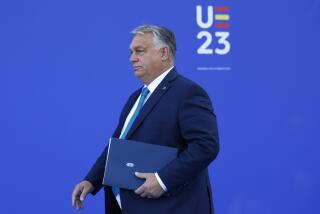Dubcek, in Rare Public Comment, Denounces ’68 Czech Invasion
- Share via
BOLOGNA, Italy — Alexander Dubcek, in a speech released Saturday, denounced the Soviet-led invasion that ousted him as Czechoslovakia’s Communist Party leader and resulted in “incalculable moral losses” and “economic stagnation” in his homeland.
Dubcek is to receive an honorary degree in political science today from the University of Bologna to honor him for the reforms he introduced in 1968 during a period that became known as the “Prague Spring.”
The university, which is marking its 900th birthday, made his speech available Saturday.
Dubcek is on his first visit abroad since he was stripped of his Communist Party membership in 1970, and he has expressed concern the government might not let him return home because of his statements in Italy.
After many years of silence, the speech marks rare public comment by Dubcek on the issues that forced him from power and the consequences they had on his country.
Speaking of the invasion in 1968 that crushed his reforms and established a hard line government, Dubcek said in his prepared speech:
“It is my firm conviction that without the external intervention in the situation of our party and our Czechoslovak society, our endeavor would have been crowned with success.”
Dubcek lamented the invasion but expressed hope that Czechoslovakia will again try to introduce elements of democracy.
“It would be enough to have a great popular leap, which, among other things, was our movement of rebirth in 1968, in order that our historical experiences so profoundly lived return to the surface and be openly manifested,” he wrote.
Dubcek, who remains a convinced communist despite being stripped of party membership, said the last two decades in Czechoslovakia were years of “economic stagnation, sterility and incalculable moral losses.”
But he added he still has hope, saying, “We are searching for something that can open the path to new developments of socialism--theoretical and practical.
“In the ‘Prague Spring,’ in its internal development and in its suffocation by external forces, everything is reflected in condensed form--the crises and the possibilities of socialism,” his speech declared. “In 1968 we learned that the key to (overcoming) the crisis doesn’t only come in the economic sphere. . . . The key was, and remains, in the political sphere.”
Quoting a line of poetry, he declared: “Despite what has been and what has happened to us, I would willingly start again where I began before.”
Dubcek said there had perhaps been excessive “intoxication” with freedom of speech in Czechoslovakia in 1968.
“But at least we were in the presence of an atmosphere which created prospects, in contrast to today, when every form of dialogue is practically inadmissible.”
Dubcek said the Czechoslovak authorities accepted only facts “which serve precise and unilateral propaganda aims.”
The younger generation was prevented from forming an independent view of recent events, he said.
Dubcek said that for various reasons the existence of a Czechoslovak problem was ignored in international relations.
“Hiding the existence of such a problem leads not only to an apology for an interventionist policy but, whether you like it or not, to . . . the undervaluing of the trauma which still weighs on Czechoslovak society,” he said.
The 66-year-old Dubcek arrived in Bologna on Friday. He lives in Bratislava and is retired from a lowly job in a forestry department office that was assigned to him 18 years ago.
Dubcek served for five months in 1970 as Czechoslovakia’s ambassador to Turkey but then was summoned back to Prague and ousted from the party. He was removed as party leader in April, 1969.
Dubcek is expected to remain about 10 days in Italy visiting Florence, Venice, Ravenna and possibly Rome. No schedule has been released.
More to Read
Sign up for Essential California
The most important California stories and recommendations in your inbox every morning.
You may occasionally receive promotional content from the Los Angeles Times.












